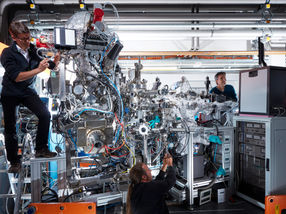New substances 15,000 times more effective in destroying chemical warfare agents
Advertisement
In an advance that could be used in masks to protect against nerve gas, scientists are reporting development of proteins that are up to 15,000 times more effective than their natural counterpart in destroying chemical warfare agents. Their report appears in ACS' journal Biochemistry.
Frank Raushel, David Barondeau and colleagues explain that a soil bacterium makes a protein called phosphotriesterase (PTE), which is an enzyme that detoxifies some pesticides and chemical warfare agents like sarin and tabun. PTE thus has potential uses in protecting soldiers and others. Natural PTE, however, works against only one of the two molecular forms of these chemical warfare agents, and it happens to be the less toxic form. The scientists thus set out to develop new versions of PTE that were more effective against the most toxic form.
To improve the enzyme's activity, Raushel and colleagues used an approach called "directed evolution." This technique imitates the way natural selection leads to improved forms of the biochemical substances in living things. In using directed evolution, the team made small random changes to the natural enzyme's chemical architecture and then tested resulting mutant enzymes for their ability to break down nerve agents. They isolated several mutants that fit the bill, including one that proved to be 15,000 times more effective than the natural enzyme.
Most read news
Organizations
Other news from the department science

Get the chemical industry in your inbox
By submitting this form you agree that LUMITOS AG will send you the newsletter(s) selected above by email. Your data will not be passed on to third parties. Your data will be stored and processed in accordance with our data protection regulations. LUMITOS may contact you by email for the purpose of advertising or market and opinion surveys. You can revoke your consent at any time without giving reasons to LUMITOS AG, Ernst-Augustin-Str. 2, 12489 Berlin, Germany or by e-mail at revoke@lumitos.com with effect for the future. In addition, each email contains a link to unsubscribe from the corresponding newsletter.































































